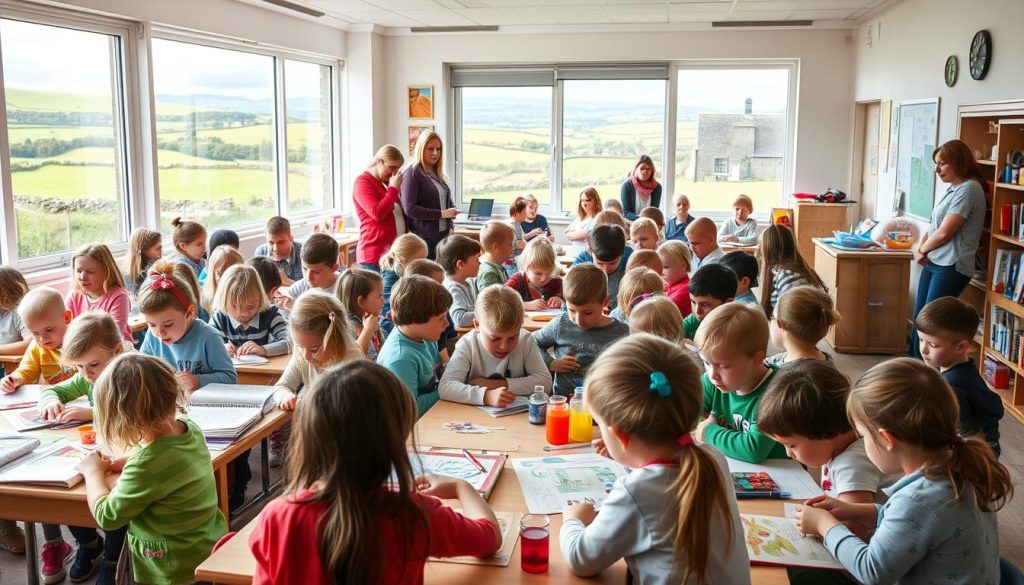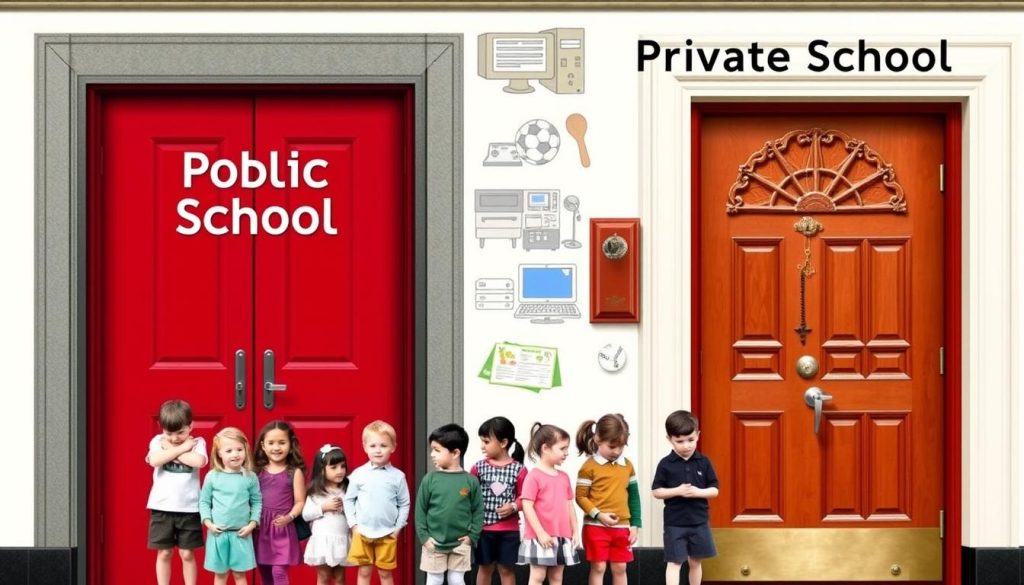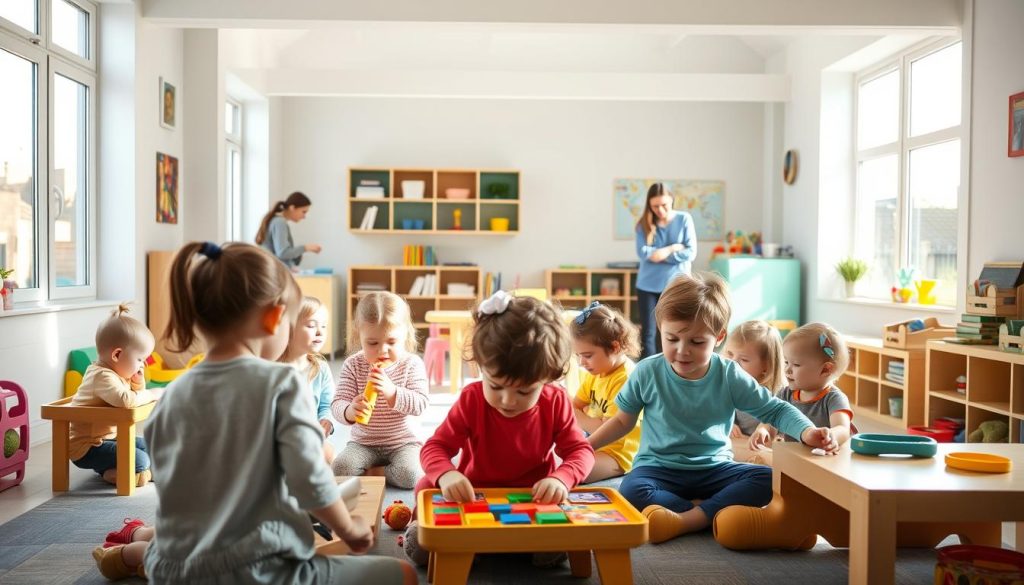If you’re thinking about moving to Ireland with your family, education and childcare are vital. They’re big factors when deciding to move and they help families settle in. Ireland promises top-notch and inclusive education, making it appealing. The Irish childcare system supports this by offering various options for working parents and kids.
- Understanding the Education System in Ireland
- Why Quality Childcare Matters for Families
- Top Considerations for Choosing a School in Ireland
- Benefits of Early Childhood Education
- Types of Childcare Options Available in Ireland
- Education and Childcare Are Significant Factors for Families Moving to Ireland
- Financial Assistance and Government Grants for Education
- Adapting to a New Education System: Tips for Families
- Language Support for Non-English Speaking Families
- How Education and Childcare Policy Impacts Families
- Success Stories: Families Thriving in Ireland’s Education System
- Choosing Between Public and Private Education
- Ensuring a Seamless Transition for Your Child
- Integrating into the Irish Community Through School Activities
- FAQ
Key Takeaways
- Relocating to Ireland offers families access to inclusive and high-quality education and childcare systems.
- The Irish education landscape is diverse, catering to various learning needs and preferences.
- Childcare services in Ireland are designed to support working parents effectively.
- The decision-making process for moving to Ireland often prioritises educational and childcare considerations.
- Families find the Irish education system attractive due to its commitment to excellence and inclusivity.
Understanding the Education System in Ireland
The education system in Ireland has many stages. It provides learning chances from early years to higher education. Knowing about each stage helps families make smart choices for their children’s education. This includes choosing the right schools and universities.
Primary Education
Irish primary schools teach children aged 4 to 12. The Department of Education sets the curriculum. It includes subjects like English, Maths, and PE. The aim is to develop students’ skills, growth, and creativity. High literacy and numeracy rates show the success of these schools.
Secondary Education
Secondary education has the Junior Cycle and Senior Cycle, for ages 12 to 18. The Junior Cycle ends with the Junior Certificate. It covers core subjects. The Senior Cycle has the Transition Year plus two years for the Leaving Certificate exams. These exams matter for university entry.
Qualifax notes that high grades open many university doors in Ireland and abroad. Students have a wide choice of universities.
Higher Education Opportunities
There are many higher education places in Ireland. Students can pick from universities and colleges. The Higher Education Authority says top universities like Trinity College Dublin offer great education. These places focus on research and jobs.
The journey from primary to higher education in Ireland ensures students are ready for the future. Irish educational frameworks support families and students’ growth.
Why Quality Childcare Matters for Families
The benefits of quality childcare provision are huge for families in Ireland. It helps children develop in their early years. This sets them up for better learning and social skills later on. Early education is key to a child’s growth, touching on their thoughts and feelings.
Choosing childcare services in Ireland is like investing in a child’s future. Good childcare aids in hitting big developmental marks. It teaches them how to think and solve problems early. It also provides a place where they make friends, learn to be independent, and work as a team.
For parents, knowing their child is in a high-quality care setting brings comfort. It helps them manage work and family life. Children gain from being in a secure, loving place that encourages learning all the time. There’s proof that early learning affects education and social habits for life.
Groups like Early Childhood Ireland and Tusla – Child and Family Agency make sure childcare in Ireland meets set standards. They check that kids have an engaging place to learn with good staff and proper educational tools.
Studies, including ones by the OECD, show quality childcare’s big role in a child’s life ahead. Kids in good programmes do better in school, get along well with others, and can handle their emotions.
Look at these differences quality childcare makes:
| Aspect | Quality Childcare Provision | Low-Quality Childcare Provision |
|---|---|---|
| Child Safety | High safety standards and regulations followed | Lack of adherence to safety protocols |
| Educational Resources | Abundant and well-maintained resources | Limited and outdated educational tools |
| Staff Qualifications | Highly trained and certified educators and caregivers | Underqualified staff with minimal training |
| Child Development | Focus on holistic early years education | Lack of structured development activities |
In the end, great childcare services Ireland are key for growing well-rounded individuals. By valuing early years education, we shape a future filled with knowledgeable, skilled, and emotionally strong people.
Top Considerations for Choosing a School in Ireland

Choosing the right school for your child means looking at several key factors. You want to make sure the school caters to both their needs and goals.
Location and Accessibility
The location of the school is very important. If it’s close to home or work, it makes life easier. It’s good to check how your child can get to school. Look into transport options and school bus services.
School Reputation and Performance
A school’s reputation and how well its students perform matter a lot. You can find this out from School Inspection Reports by the Department of Education. Also, see what other parents say and look at the school’s achievements. This tells you if the school is a good fit for your child.
Support Services Available
It’s crucial to see if the school has support for special education needs (SEN). Check resources like the National Council for Special Education to know what support is available. This ensures your child gets the right help.
Also, check if the school offers counselling and after-school clubs. Irish schools often have special programmes for different learning needs. This can really help your child succeed and grow in many ways.
| Criteria | Considerations |
|---|---|
| Location and Accessibility | Proximity, Transport Links, School Buses |
| School Reputation and Performance | Inspection Reports, Academic Achievements, Parental Feedback |
| Support Services Available | SEN Support, Counselling, Extracurricular Activities |
Benefits of Early Childhood Education
Early childhood education is vital for a child’s growth and learning journey. In Ireland, focusing on early years learning boosts a child’s cognitive, social, and emotional abilities. It lays a strong foundation for their future.
Studies show that kids in preschool education advantages do better in school later on. Starting early helps them grow their minds and love learning. This early boost is key for their success in school and life.
The perks of early learning also include better social skills and happiness. According to the child development Ireland studies, children who start learning early find it easier to make friends and fit in. These benefits last a lifetime, shaping them into well-rounded adults.
UNICEF says investing in early years learning closes the education gap later on. This doesn’t just help the child. It makes society fairer and more skilled, benefiting everyone.
So, early childhood education offers many advantages:
- Enhanced cognitive abilities and academic performance
- Improved social skills and emotional resilience
- Greater adaptability and peer interaction
- Long-term societal and individual benefits
Putting early childhood education first is key for child development Ireland. It sets our kids up for a bright and successful future.
Types of Childcare Options Available in Ireland
Choosing the right childcare is essential for parents in Ireland. There are many childcare facilities in Ireland, each offering different benefits. It’s key to know these options to support your child’s learning and growth.
Crèches and Childminders
Crèches are places where children learn and play together in a group. They offer structured activities that help with kids’ physical and mental development. Childminders provide care in a home-like setting, giving a personal touch and flexibility.
Montessori and Steiner Education
Montessori schools encourage kids to learn at their own pace, focusing on independence and life skills. Steiner education, or Waldorf, blends imaginative play with nature and learning, caring for the whole child.
Playgroups and After-School Clubs
Playgroups offer a place for young children to make friends and learn through play. This nurtures their social skills early on. After-school clubs are great for older kids. These clubs provide fun learning activities and help children make friends.
Education and Childcare Are Significant Factors for Families Moving to Ireland

Families often think of education and childcare first when moving. These are key for children’s happiness and the family’s overall contentment. In Ireland, schools and childcare services are big reasons why families decide to move there.
Every year, lots of families choose Ireland for its great schools, as Eurostat shows. This move for better education shows how important good schools and childcare are to families. They look for places where their kids can learn well and be cared for.
The Immigration Council of Ireland has policies to help families stay together. Schools and childcare in Ireland help families mix into the community. They provide big support.
For families moving to Ireland, finding the right school is a big deal. Parents check how good schools are before they decide to move. Ireland offers many education programs and support for kids to help them grow in a supportive setting.
To sum up, education and childcare matter a lot to families moving internationally. These things are big in choosing to move to Ireland. They make sure family needs are met, making the move easier and life better.
Financial Assistance and Government Grants for Education
Finding funds for education in Ireland worries many families. Luckily, many financial help programmes exist to help students get the resources they need for a brighter future. We’ll look at the support available, like scholarships, bursaries, and government grants.
Scholarships and Bursaries
Scholarship opportunities are key in helping students with outstanding academic or extracurricular achievements. These are usually based on merit and offer a lot of financial support. They let students study without stressing about tuition fees. Many groups, including universities and private companies, provide these with specific application steps and who can apply.Educational grants in the form of bursaries help students from less wealthy families afford education. Bursaries often pay for tuition, books and sometimes, living costs.
Government Grants and Supports
The Irish government has several grant and subsidy programmes for students. A well-known one is the SUSI grant. SUSI helps with tuition, housing and everyday costs. Whether you get this grant depends on family income, what you’re studying, and your education history. Applying is easy, you just need the right financial and school documents.
There’s also help from various educational trusts in Ireland. For example, the Irish Universities Association runs trust funds. These funds support students who don’t have much money, so they can go to university.
Adapting to a New Education System: Tips for Families
Moving to Ireland and adapting to its schools can be smooth with the right approach. Here are some tips to help families adjust to Irish educational systems:
Familiarise with School Routines: Start by learning the daily routines at Irish schools. Schools provide details on starting times, breaks, and extracurricular activities.
Attend Induction Meetings: Irish schools often have induction meetings for new families. These are key to understanding the school’s values, discipline, and support services. They also introduce the National Parents Council-Primary for more insight.
Join Parent-Teacher Associations (PTAs): Getting involved in PTAs is great for meeting other parents. It allows you to share concerns and take part in school events. This helps with the educational transition.
Understand Cultural Norms: Look into guidance from the Irish National Teachers’ Organisation on Ireland’s educational culture. Knowing these norms makes students more comfortable and helps them fit in better.
Utilise Psychological Resources: Resources from the Psychological Society of Ireland are very helpful. They offer advice on managing emotions and behaviour while adjusting to new settings.
Create a Study Routine at Home: Having a study routine at home helps children understand what’s expected of them. This eases anxiety and boosts their learning.
Language Support: If your family needs help with English, many schools offer ESL resources. Using these resources and practising English at home speeds up language learning.
Social Integration through Activities: Encourage joining after-school clubs and sports. It’s a great way for your child to make friends and get used to Irish culture more quickly.
Here are some key points to remember:
- Familiarise with school routines
- Attend induction meetings
- Join Parent-Teacher Associations
- Understand cultural norms
- Utilise psychological resources
- Create a study routine at home
- Seek language support
- Encourage participation in social activities
Active participation and using available resources are crucial for a smooth educational transition. By following these steps, families can help their children have a positive experience at Irish schools while settling into Ireland.
Language Support for Non-English Speaking Families
Moving to Ireland can be tough for families who don’t speak English well. Thankfully, Ireland offers great support to help these families get used to the schooling system.
ESL Classes and Resources
Ireland has many ESL (English as a Second Language) classes to help students get better at English. These classes meet the different needs of students. They make sure students can keep up in their classes.
There are textbooks, online lessons, and fun interactive tools for students. The Department of Education makes sure there are good teachers and enough materials for these programs. This helps students improve their English quickly.
Integration Programmes
Irish schools help students fit in by focusing on language and culture. Local councils work with groups like the Immigrant Council of Ireland to make these programmes. Students can join activities, cultural events, and make Irish friends.
This helps students learn about Irish life and feel more at home. It’s great for making friends and understanding new customs.
- Language Support Services Coordination
- Cultural Exchange Programmes
- Peer Mentorship Initiatives
| Programme | Description | Organisation |
|---|---|---|
| ESL Classes | Provides tailored English language instruction | Department of Education |
| Integration Workshops | Cultural and social orientation sessions | City and County Integration Strategies |
| Support Networks | Peer support and mentorship | Immigrant Council of Ireland |
Language help and fitting-in programmes let families ease into the Irish education system. These efforts are key to making sure students do well and feel included in Ireland.
How Education and Childcare Policy Impacts Families
The impact of educational legislation Ireland on families is huge. It shapes the learning environment and the wellbeing of children. The Irish National Strategy for Education for Sustainable Development promotes sustainable practices. This influences family life and societal values.
Childcare reform focuses on improving early childhood education quality and accessibility. The National Policy Framework for Children & Young People highlights the need for affordable, high-quality childcare. These reforms help working parents and support child development by making childcare more accessible and affordable.
Policymakers in Oireachtas debates often discuss education policy advancements. They cover compulsory education age, curriculum changes, and support for students with special needs. These debates can lead to real changes that affect families and their routines.
| Aspect | Key Changes | Family Impact |
|---|---|---|
| Age of Compulsory Education | Lowered to four years | Earlier start for children, impacting childcare and work schedules |
| Curriculum Reform | Introduction of more holistic subjects | Broader education scope, fostering diverse skills |
| Support for Special Needs | Increased funding and resources | Better support for families with special needs children |
Family impact policies play a crucial role in creating a supportive environment for children and parents. As policies evolve, the situation for families in Ireland changes too.
Success Stories: Families Thriving in Ireland’s Education System
Success in Irish education isn’t just about good grades. It’s about working together – students, parents, and teachers. Many families have told inspiring stories. They talk about the great benefits and positive changes they’ve seen.
Testimonials from Parents
Parents say a supportive school can really help a child grow. The O’Brien family, for example, praised their local teachers’ hard work. “Our child is more confident and doing better at school thanks to the supportive environment,” Mr. O’Brien said.
The Collins family also saw big improvements. “The special education team helped our child’s learning in huge ways. They’ve made a real difference,” Mrs. Collins remarked. Stories like these show how important good teachers and support are for education in Ireland.
Student Achievements
In Ireland, lots of students do really well because of their hard work and strong school support. The National Student Awards have celebrated many of these successful students.
At school events each year, students share their own success stories. These stories are not only about awards but also about how much they’ve grown. They inspire other students and their families too.
| Family Name | Student Achievement | Supporting Factors |
|---|---|---|
| Murphy | Top of Class in Maths | Dedicated Teachers, Parental Support |
| Kelly | Outstanding Progress in Science | After-School Clubs, Mentorship Programs |
| Ryan | National Essay Competition Winner | Encouraging School Environment |
Choosing Between Public and Private Education

Choosing the right education path for your child involves comparing state and private schools. Each has its own advantages, fitting different family needs.
State schools are government-funded and follow the national curriculum. This means they offer a standard education for free. They reflect the local community and are widely accessible. Private schools, however, require tuition fees but provide customised curriculums, smaller classes, and better resources.
Cost is a big factor when deciding between the two. State schools help families save money. But private schools offer more resources, activities, and attention to students for their fees.
| Aspect | State Schools | Private Schools |
|---|---|---|
| Funding | Government-funded | Privately funded through tuition fees |
| Curriculum | National curriculum | Flexible and tailored to students’ needs |
| Class Sizes | Larger | Smaller |
| Resources | Standard | Enhanced |
| Extracurricular Activities | Limited | Extensive |
| Cost | Free | Fee-paying |
Some parents look for the best academic settings and resources, choosing private schools. Others value social integration and lower costs, opting for state schools. Studies show both choices can lead to a great education, depending on what the family values most.
In the end, choosing between public and private schools comes down to what you value most. Consider your finances, educational goals, and family values. This will help you make the best choice for your child’s future.
Ensuring a Seamless Transition for Your Child
Moving to a new school can be tough for kids and parents. Making the change easy needs careful planning emotionally and in practical ways. This includes getting involved with the school early, helping your child get ready for the change, and sorting out things like enrolment and getting to school.
Connecting with teachers and staff beforehand is a smart move. This helps parents know what the school expects. It also helps with getting everything set up for your child’s learning. This makes it easier for kids to adjust to their new school.
Before the move, you can learn about the school through virtual tours and talks with teachers. This makes everything more familiar and less scary for your child. Getting a head start on schoolwork also helps build their confidence.
Sorting out how your child will get to school is key too. Having a good plan for transport can make everyday life easier. For advice on signing up for school, resources from the Department of Education and Children’s Rights Alliance are very helpful.
Having a support network is essential as well. Peer mentoring and advice from school counsellors can make a big difference. They help your child feel they belong. This is very important for settling into a new school well.
Integrating into the Irish Community Through School Activities
It can be tough moving to a new country and fitting in. Families find that joining in school activities helps a lot in Ireland. Schools are the heart of the community, offering many ways to join in through events and groups.
The National Parents Council Post-Primary speaks to the value of parental involvement. By getting involved in school meetings and groups, parents make connections. They also help their kids adjust better and do well in school.
Being part of extracurricular activities is key for getting along with others. Initiatives like the Active School Flag push kids to join sports and arts. These activities let kids make friends, learn new things, and feel closer to classmates. Parents also enjoy going to events like sports days and music recitals, where they can meet other families.
Community National Schools in Ireland work hard to be welcoming and diverse. They host events like multicultural festivals and community projects. These help families mix and celebrate different cultures together. Joining in these events also builds stronger community ties.
To wrap it up, school activities are essential for families new to Ireland. By taking part in different events and projects, families can get more involved in school life. They build connections and settle into their new surroundings more easily.

















